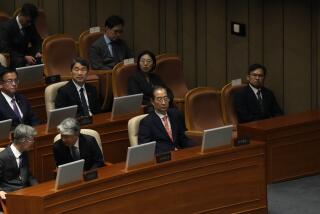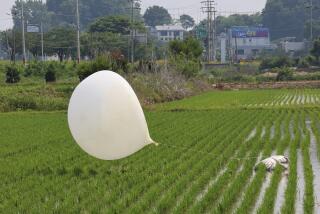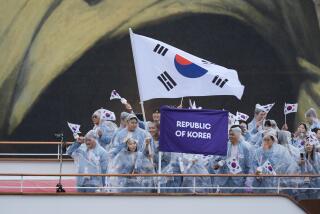Distance grows with mistrust between the two Koreas
BEIJING — With surprising speed, the rapprochement between the Koreas has unraveled over the last month since the shooting of a South Korean tourist at a North Korea resort.
The North on Sunday started expelling South Korean workers from the resort at Mt. Kumgang, which for close to a decade has been a symbol of Korean reconciliation efforts.
Squabbling between the Koreas also forced organizers of the Beijing Olympics to rearrange the opening ceremony Friday to keep the two nations’ delegations apart. It was the first time since 1996 that the Koreans had marched separately at the Games’ opening ceremony and a sign of just how much the relationship has deteriorated.
The strains have been building since July 11, when a 53-year-old South Korean homemaker was shot to death, apparently while taking a sunrise walk on a beach.
Although there was little dispute that a North Korean soldier fired the fatal shots, the North lashed out at South Korea. The communist regime said the tourist, Park Wang-ja, had strayed into a military zone, and it refused the South’s request for an inquiry. The South has suspended tours to the resort.
Since 1998, almost 2 million South Koreans have visited Mt. Kumgang, which is on the east coast of the peninsula just north of the demilitarized zone. The resort, which has hiking trails, a golf course, a spa and a beach, also has been used for reunions of Korean families divided between the two countries. It is a major source of hard currency for impoverished North Korea.
Although the site is now closed, about 150 South Koreans are still there, most of them staffers of Hyundai Asan, the company that runs the resort. South Korea said the first four left Sunday and 10 more would leave today.
North Korea said it was taking a “principled stand . . . regarding the error committed by a tourist of the south side.”
With rhetoric reminiscent of the worst periods of tension on the Korean peninsula, the North lashed out at South Korean President Lee Myung-bak, who took office in February, calling him a “puppet” and “traitor” who would “bring inter-Korean relations to catastrophe.”
South Korean analysts said that the spat had less to do with the shooting incident than with North Korean anxieties about Lee, who met last week with President Bush.
“The North Koreans have a very sour feeling toward the new government in Seoul, and they are giving expression to their feelings. You might see a protracted period of this kind of behavior,” said Lee Dong-bok, a former South Korean intelligence official specializing in North Korea.
The South Korean president is a conservative who has accused his predecessors of giving too much to the North and getting little in return.
North Korea’s anger was apparent at Friday night’s Olympic opening ceremony here. The North Koreans demanded that they not have to march directly behind the South Koreans. That forced the Beijing organizers to rearrange the delegations so that Fiji, Cameroon and Montenegro came in between. The Chinese also had to make last-minute seating changes so that North Korea’s second in command, Kim Yong Nam, would not be near Lee.
“You could see that the distrust between the two Korean governments is much deeper than we expected,” said Paik Hak-soon, director of inter-Korean studies at South Korea’s Sejong Institute.
The contrast with the 2000 Sydney Olympics couldn’t have been greater. Those Games came shortly after a landmark meeting between North Korea’s Kim Jong Il and then-South Korean President Kim Dae-jung, who would later win a Nobel Peace Prize for that year. Athletes from the two Koreas walked into the stadium together holding a placard that simply read “Korea,” and were greeted by thunderous applause. They again marched jointly in 2004 in Athens and in 2006 in Turin, Italy, at the Winter Games. (The North skipped the 2002 Games in Salt Lake City.)
Many had hoped that this year they could go even further, not merely marching together but joining as a team. Negotiations on uniting the teams quickly broke down when the North Koreans demanded that the athletes be split 50-50. That was immediately rejected by South Korea, which has twice the population.
--
More to Read
Sign up for Essential California
The most important California stories and recommendations in your inbox every morning.
You may occasionally receive promotional content from the Los Angeles Times.










